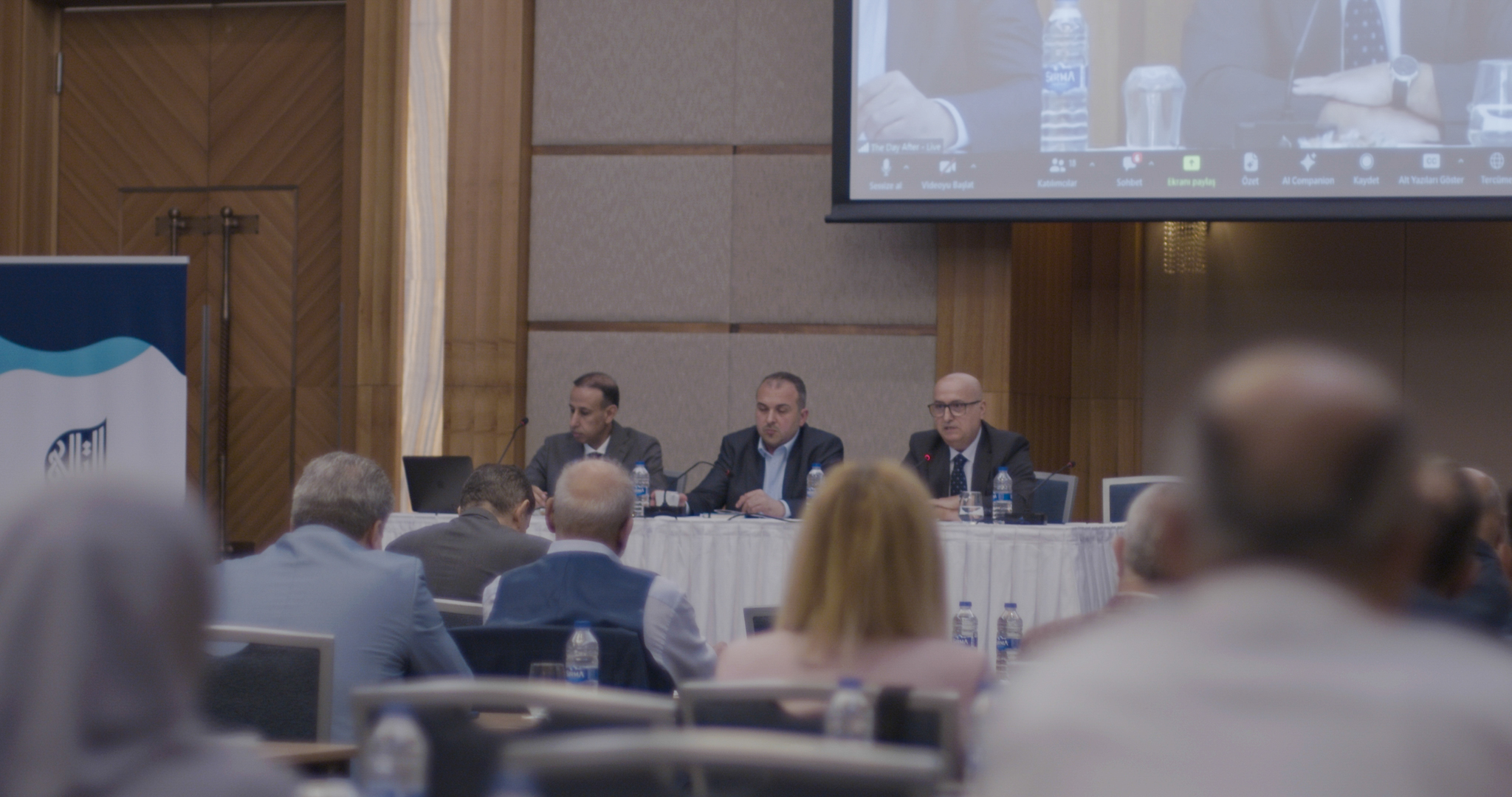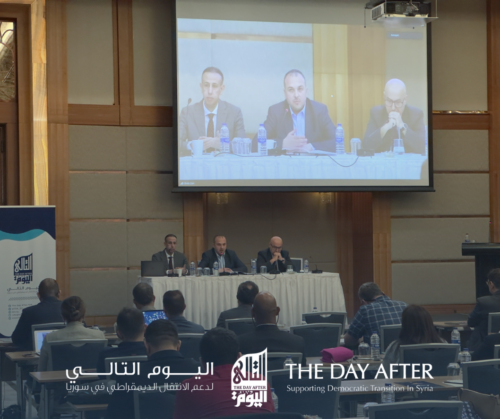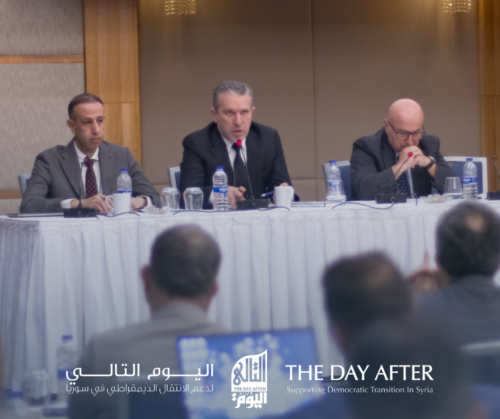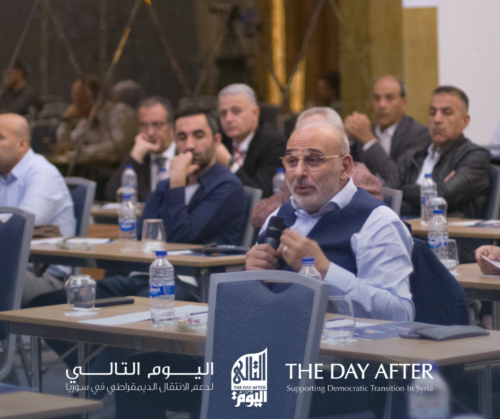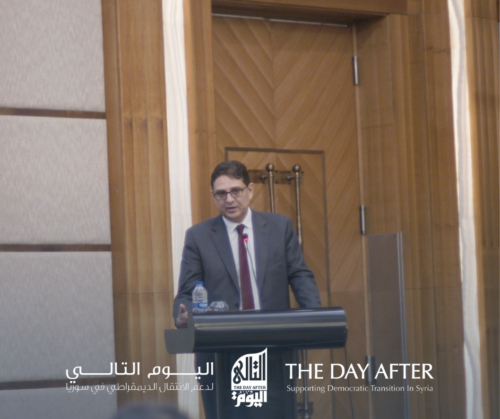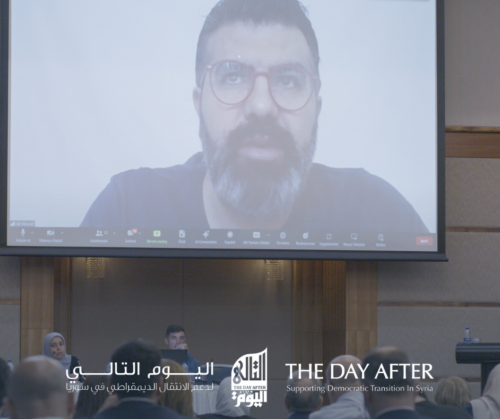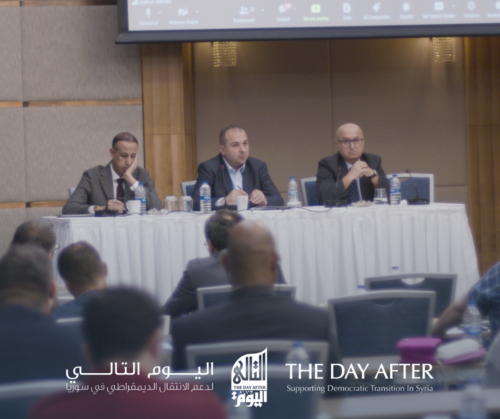The journey towards a democratic Syria remains incomplete without the establishment of fair elections that genuinely reflect the will of the people. These elections constitute a vital democratic space where individuals from diverse backgrounds can select their representatives. Therefore, in the post-political solution phase, it is imperative that elections are built upon a solid foundation of rules and regulations, supported by technical, legal, security, and social studies. This approach ensures a smooth transition from the era of a totalitarian regime that manipulated elections for its own interests and power to a system that fosters true and unhindered participation, echoing the aspirations and choices of the Syrian population. It serves as the authentic gateway to democracy, all within a secure and impartial environment that allows the active participation of all Syrian citizens, in line with the principles of UN Security Council Resolution 2254 from 2015.
| You can access the full report on “Electoral Reform and Democratic Transition in Syria” through this link. |
With this belief as its guiding principle, TDA convened a conference in Istanbul to deliberate on the report it published last year, titled “Electoral Reform and the Democratic Transformation Process in Syria.” The conference aimed to thoroughly review and endorse its recommendations, and it brought together approximately 85 participants, both in-person attendance and remotely (online). Among these participants were experts, dedicated researchers, politicians, and journalists.
This collective effort serves to underscore and fortify the significance of advancing along this trajectory in preparation for an imminent transitional phase in Syria, aligning with the provisions of UN Security Council Resolution 2254 from 2015. This resolution charted a roadmap for Syria’s democratic transition, calling for the organization of free and fair elections, conducted within 18 months, supervised by the United Nations, and in full compliance with governance standards and the highest global norms of transparency and accountability. These elections are intended to include all eligible Syrians, even those residing in the diaspora.
The meeting delved into various intricate details and aspects closely aligned with the report published by The Day After. It encompassed a comprehensive examination of the constitutional, legal, technical, and representative dimensions of the electoral process. Furthermore, it explored the roles played by relevant institutions in the electoral process, international oversight, political engagement, and strategies for their reform, all tailored to the specific context of Syria’s transition and the prevailing conditions within the country.
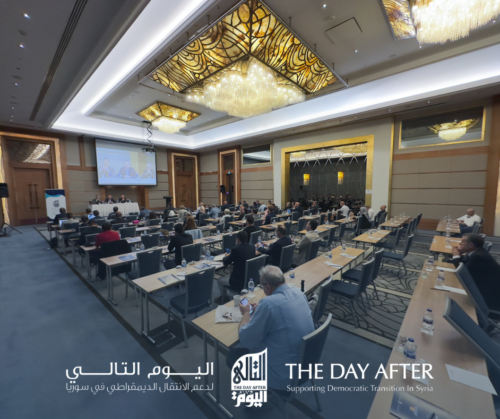
Two distinct approaches, technical and legal, were employed to examine and reform the electoral process in Syria.
The initial session, featuring Dr. Sam Dallah, a professor of Constitutional Law and Political Systems, and legal advisor Mr. Khaled Adwan Al-Helu, shed light on the absence of a conducive legal and political environment for conducting free and fair elections. It highlighted how legislative actions have perpetuated authoritarianism since the Baath coup in 1963 and the infringement of human rights in Syria. This session also delved into international instruments and standards related to elections, Syria’s compliance with these standards, and the degree to which Syrian legislation clashes with international norms.
In the subsequent session, the focus shifted to the technical aspect of electoral systems. Dr. Ali Murad, a political and human rights activist, and Dr. Nael Girgis, a human rights specialist, discussed various types of electoral systems, exploring their merits and drawbacks. They emphasized that the choice of an electoral system and the division of electoral districts are pivotal factors influencing the quality of the electoral process and the resulting political system. In the context of post-conflict countries, it was stressed that elections in the wake of a political transition must incorporate mechanisms ensuring accurate, comprehensive representation, ultimately contributing to the mitigation of societal divisions and national reconciliation.
Throughout the conference, speakers and attendees engaged in discussions regarding the most suitable electoral systems for the Syrian situation, considering the lack of equitable electoral district divisions and the significant demographic, sectarian, and ethnic changes resulting from the conflict.
UN Oversight and Ensuring Integrity and Participation
In the third session of the meeting, featuring Mr. Muhannad Sharabati and Judge Anwar Magni, the discussion revolved around the prospects of establishing a national election management body in Syria. Emphasis was placed on the pivotal role of the United Nations in the formation of such a body during the transitional phase, especially after decades of limited democratic practices. This was further underscored by the substantial number of Syrians residing outside the country.
Beyond election management, the session also addressed the significance of the judiciary, media, and security institutions as crucial safeguards integral to the electoral reform process in Syria. These institutions have vital roles in providing support, oversight, and facilitating the success of elections.
The final session focused on strategies to enhance participation in Syrian elections, featuring speakers such as researcher Mazen Ghariba, Executive Director of the Syrian-British Council, lawyer Rula Baghdadi, Executive Director of Dawlaty Organization, and researcher Raad Atli. The discussion highlighted the importance of women’s political participation, challenges related to the involvement of refugees and displaced individuals in elections, opportunities and obstacles for political parties’ participation, and the role of Syrian civil society in the electoral process, particularly within the transitional phase.
Addressing Ongoing and Future Challenges
Throughout the sessions of the electoral reform conference, which brought together experts, politicians, and researchers, a multitude of issues and challenges were raised for deliberation. These focused on concerns related to the stagnant political process, impediments in the negotiation process, and obstacles stemming from demographic shifts due to the displacement and exodus of millions of Syrians. Moreover, participants acknowledged the forthcoming challenges associated with the complex nature of a complete democratic transition, understanding that it cannot be swiftly achieved and demands sustained efforts over time.
On the political front, the electoral aspect was a focal point of discussion, one of the four pivotal baskets in the negotiation process. This session saw the participation of Badr Jamous, the head of the Syrian Negotiating Commission, who provided insights into the Commission’s Elections Committee. This committee is actively engaged in formulating an electoral plan intended for presentation within the negotiation process.
During a side meeting at the event, Dima Moussa, Vice President of the Syrian Opposition Coalition, raised concerns about the current stagnation in the political process and its repercussions on the prospects for a political transition for Syrians. She stressed the importance of being well-prepared for this crucial starting point, acknowledging that the process will commence at some juncture. She underscored the responsibility of opposition members to consider electoral reform as an integral part of their preparations for negotiations aimed at achieving a political settlement.
Jamal Suleiman, an opposition member, highlighted several challenges facing elections in Syria, including issues related to political finances, which have been tainted by years of corruption, arms and drug trafficking, taxation, plunder, and border crossings. He also emphasized the presence of de facto authorities in various regions, even outside the control of the regime. This situation, along with the influence of non-state actors, hampers the expression of the free will of Syrian voters, potentially turning the electoral process into a mere facade and leading back to the previous status quo.
Looking forward, legal advisor Khaled Al-Helou cautioned against expecting immediate success in the first round of elections, drawing parallels with the post-Arab Spring experiences in some Arab nations. He stressed that a single round of elections does not guarantee the transition to a stable phase, possibly allowing previous regimes, whether military or authoritarian, to make a return to power.
Addressing Ongoing and Future Challenges
Throughout the sessions of the electoral reform conference, which brought together experts, politicians, and researchers, a multitude of issues and challenges were raised for deliberation. These focused on concerns related to the stagnant political process, impediments in the negotiation process, and obstacles stemming from demographic shifts due to the displacement and exodus of millions of Syrians. Moreover, participants acknowledged the forthcoming challenges associated with the complex nature of a complete democratic transition, understanding that it cannot be swiftly achieved and demands sustained efforts over time.
On the political front, the electoral aspect was a focal point of discussion, one of the four pivotal baskets in the negotiation process. This session saw the participation of Badr Jamous, the head of the Syrian Negotiating Commission, who provided insights into the Commission’s Elections Committee. This committee is actively engaged in formulating an electoral plan intended for presentation within the negotiation process.
During a side meeting at the event, Dima Moussa, Vice President of the Syrian Opposition Coalition, raised concerns about the current stagnation in the political process and its repercussions on the prospects for a political transition for Syrians. She stressed the importance of being well-prepared for this crucial starting point, acknowledging that the process will commence at some juncture. She underscored the responsibility of opposition members to consider electoral reform as an integral part of their preparations for negotiations aimed at achieving a political settlement.
Jamal Suleiman, an opposition member, highlighted several challenges facing elections in Syria, including issues related to political finances, which have been tainted by years of corruption, arms and drug trafficking, taxation, plunder, and border crossings. He also emphasized the presence of de facto authorities in various regions, even outside the control of the regime. This situation, along with the influence of non-state actors, hampers the expression of the free will of Syrian voters, potentially turning the electoral process into a mere facade and leading back to the previous status quo.
Looking forward, legal advisor Khaled Al-Helou cautioned against expecting immediate success in the first round of elections, drawing parallels with the post-Arab Spring experiences in some Arab nations. He stressed that a single round of elections does not guarantee the transition to a stable phase, possibly allowing previous regimes, whether military or authoritarian, to make a return to power.
Recommendations: When Can Electoral Reform Be Implemented?
The “Electoral Reform and Democratic Transition Process” report has put forward a comprehensive set of recommendations, addressing both practical legal and technical aspects. These recommendations include the reform of legislation, the selection of the most suitable electoral system for Syria, and the management, nature, form, guarantees, and promotion of participation in elections. (Please refer to page 211 of the report for the complete list of recommendations.)
Throughout the meeting, participants engaged in discussions surrounding the challenges of electoral reform and the electoral process. New recommendations were suggested, underscoring the importance of expanding the scope of research on electoral reform. This expansion should encompass various dimensions, including political and societal considerations.
Mutasem alSyoufi, Executive Director of The Day After, highlighted that “the report aims to convey that conducting elections, given the authoritarian context and the backdrop of conflict, is a complex process that cannot be rushed by simply fast-tracking election laws and calling for voter participation. Such an approach might yield outcomes that exacerbate divisions and problems within Syria. These outcomes would not truly represent the people’s will.” He emphasized the need to establish a secure and impartial environment, which is essential for conducting elections that genuinely mirror the will of the Syrian population. These elections should be an integral part of a Syrian settlement, instilling trust in their credibility and serving as a step towards ending the conflict, addressing the grievances of the Syrian people, and revitalizing the nation after years of destruction and war.
In addressing the discussion of electoral reform ahead of the initiation of a political solution, alSyoufi stressed the need for early engagement. He expressed that it is essential for individuals involved in the political process to start contemplating and deliberating over electoral matters. These considerations should be underway, with political, civil, and legal experts gaining the necessary knowledge and tools for active engagement in the electoral process.
AlSyoufi further emphasized the importance of initiating dialogues on electoral reform, even at the local, trade union, and association levels, to initiate these crucial discussions. However, he also underlined that these discussions should go hand in hand with the political process, especially during the negotiation and design phases of the political agreement. This approach ensures a sequence of reforms that will pave the way for a conducive environment to conduct elections in the future.
